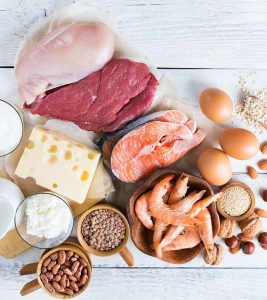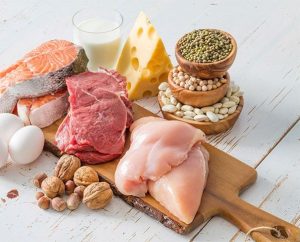Which Food Has Highest Protein? Exploring Protein Sources
Crowning a single champion of protein is tricky, as various factors like serving size and preparation methods can influence protein content. However, some contenders consistently rank high on the protein charts:
- Dried Meat: Dehydrated meats like beef jerky or dried fish concentrate protein content through water removal. A single serving (28g) of dried beef jerky can offer a whopping 25 grams of protein.
- Eggs: Nature’s protein powerhouses, whole eggs provide around 6 grams of protein per large egg, and egg whites boast an impressive 4 grams per egg white. They’re also versatile ingredients, easily incorporated into various meals.
- Chicken Breast: A classic source of lean protein, skinless, boneless chicken breast delivers around 27 grams of protein per 3-ounce serving. It’s popular for its mild flavor and adaptability to different culinary styles.
- Beans and Lentils: These legumes are protein powerhouses, often delivering around 15-20 grams of protein per cooked cup. They’re also rich in fiber and other essential nutrients, making them well-rounded dietary additions.
- Tofu and Tempeh: Plant-based protein champions, tofu and tempeh are derived from soybeans and offer around 8-10 grams of protein per 3-ounce serving. They’re popular meat alternatives for vegetarians and vegans.
Understanding Protein
Proteins are complex molecules composed of amino acids, often described as the building blocks of life. There are 20 different amino acids, nine of which are essential, meaning the body cannot produce them and must obtain them from food sources. Proteins are involved in numerous bodily functions, including structural support, enzyme catalysis, and cell signaling. Also, read about Which eggs are best for protein
Daily Protein Requirements
The recommended daily intake of protein varies based on several factors, including age, sex, weight, activity level, and overall health status. For most adults, aiming to consume approximately 0.8 grams of protein per kilogram of body weight per day is a common guideline. However, individual protein needs may vary, with athletes, older adults, and individuals recovering from illness or injury requiring higher protein intake to support muscle maintenance and repair.
Exploring Protein Sources
Protein can be obtained from both animal-based and plant-based sources, each offering unique nutritional profiles and health benefits.
Animal-Based Proteins
Animal-based protein sources include:
- Lean Meats and Poultry: Chicken breast, turkey breast, lean cuts of beef, and pork loin are excellent sources of high-quality protein.
- Fish and Seafood: Salmon, tuna, trout, shrimp, and cod are not only rich in protein but also provide essential omega-3 fatty acids.
- Dairy Products: Greek yogurt, cottage cheese, milk, and cheese are dairy options packed with protein, calcium, and other essential nutrients.

Plant-Based Proteins
Plant-based protein sources include:
- Legumes and Beans: Lentils, chickpeas, black beans, and kidney beans are nutrient-dense sources of plant-based protein, fiber, and various vitamins and minerals.
- Nuts and Seeds: Almonds, peanuts, chia seeds, and pumpkin seeds are not only rich in protein but also provide healthy fats, fiber, and micronutrients.
- Soy Products: Tofu, tempeh, edamame, and soy milk are complete sources of plant-based protein, containing all nine essential amino acids in sufficient quantities.
Comparison of Protein Content
While both animal-based and plant-based foods contribute to protein intake, some options stand out for their exceptionally high protein content per serving. For example, soy products like tofu and tempeh offer complete protein profiles, making them valuable additions to a plant-based diet. Discover more about What the Difference Between White and Brown Eggs
Factors to Consider When Choosing High-Protein Foods
When selecting high-protein foods, it’s essential to consider factors such as:
- Nutritional Value: Look for foods that not only provide protein but also offer essential vitamins, minerals, and other nutrients.
- Dietary Preferences: Consider personal taste preferences, cultural influences, and ethical considerations when choosing protein sources.
- Allergies and Restrictions: Be mindful of any food allergies or dietary restrictions that may impact food choices and protein intake.

Incorporating High-Protein Foods into Your Diet
Incorporating high-protein foods into meals and snacks can help meet daily protein needs and promote feelings of fullness and satiety. Here are some practical tips for incorporating high-protein foods into your diet:
- Start your day with a protein-rich breakfast, such as eggs, Greek yogurt, or a protein smoothie.
- Include lean protein sources in main meals, such as grilled chicken, fish, tofu, or legumes.
- Snack on protein-rich foods like nuts, seeds, cheese, or hummus with vegetables.
- Experiment with plant-based protein sources like quinoa, lentils, and tempeh in your favorite recipes.
Potential Benefits of High-Protein Diets
Consuming adequate protein has been associated with various health benefits, including:
- Weight Management: Protein-rich foods can help control appetite and promote weight loss or weight maintenance by increasing feelings of fullness and reducing calorie intake.
- Muscle Building and Repair: Protein is essential for building and repairing muscle tissue, making it crucial for athletes, fitness enthusiasts, and individuals engaging in strength training.
- Metabolic Health: Protein can help stabilize blood sugar levels, improve insulin sensitivity, and reduce the risk of type 2 diabetes and metabolic syndrome.

Risks and Considerations
While protein is essential for health, consuming excessive amounts or relying heavily on certain protein sources may pose risks, including:
- Kidney Strain: High-protein diets may put strain on the kidneys, particularly in individuals with pre-existing kidney conditions.
- Nutritional Imbalance: Focusing solely on high-protein foods may lead to deficiencies in other essential nutrients, such as fiber, vitamins, and minerals.
- Digestive Discomfort: Some people may experience digestive issues, such as bloating or constipation, when consuming large amounts of protein, especially from certain sources like dairy or highly processed meats.
Conclusion
Protein is a vital nutrient required for various physiological functions in the body. While many foods contain protein, some are particularly rich sources, offering an array of health benefits. By incorporating a variety of high-protein foods into your diet, you can meet your daily protein needs and support overall health and well-being.
FAQs
What are complete proteins?
Complete proteins are foods that contain all nine essential amino acids in sufficient quantities. Examples include meat, poultry, fish, eggs, dairy products, and soy products.
Can you get enough protein from plant-based sources?
Yes, it’s possible to obtain enough protein from plant-based sources by consuming a varied diet that includes legumes, beans, nuts, seeds, soy products, and whole grains.
Is too much protein bad for your health?
While protein is essential for health, excessive protein intake may have potential risks, such as kidney strain, nutritional imbalances, and digestive issues. It’s important to consume protein in moderation and as part of a balanced diet.
How does protein intake relate to exercise and fitness goals?
Protein plays a crucial role in muscle building, repair, and recovery after exercise. Athletes and individuals engaged in regular physical activity may have higher protein requirements to support their training goals.
Are protein supplements necessary for meeting daily requirements?
While protein supplements can be convenient for some individuals, they’re not necessary for meeting daily protein requirements. Whole foods should be the primary source of protein in a balanced diet, with supplements used as needed to supplement dietary intake.
